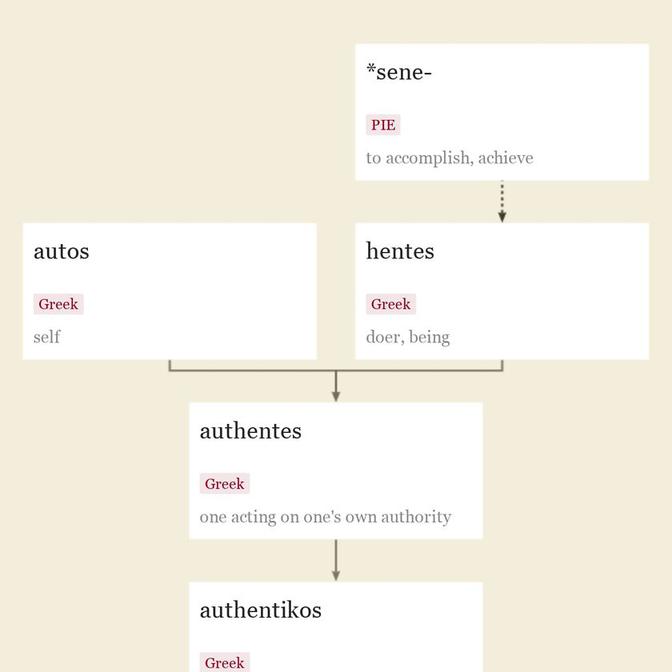authenticity (n.)
"真实或被认为是真实或正确的质量",1760年,来自 authentic 和 -ity。更早的词汇有 authentity(1650年代)和 authenticness(1620年代)。
最早记录年份: 1760
authenticity 的相关词汇
authentic (adj.)

十四世纪中期, autentik ,意为“权威的,被授权的”(现已不使用),源自于古法语 autentique “真实的; 权威的”(13世纪,现代法语 authentique ),直接源自于中世纪拉丁语 authenticus,来自于希腊语 authentikos 的“原始的,真正的,原则性的”,由 authentes 的“自行其事的人”组成,由 autos 的“自己”(参见 auto- )和 hentes 的“做者,存在者”(来自于 PIE 語根 *sene- (2)“完成,达成”)。“真实的,有权威的”这一含义记载于十四世纪中期。
传统上在现代用法中, authentic 意味着所涉事物的内容符合事实且非虚构(因此“值得信赖的,可靠的”); 而 genuine 意味着所涉事物的真正作者就是这个,我们接触的就是作者原来的样子(因此,“原汁原味的”); 但是这一区分并非总是得以维持:“18世纪宣传者试图建立的 genuine 和 authentic 之间的区别......与后者的词源不太相符,并且现在已不再承认” [OED]。
-ity
这个词缀用于从形容词中构成抽象名词,表示“成为______的状态或品质”,源自中古英语的 -ite,来自古法语的 -ete(现代法语为 -ité),直接源自拉丁语的 -itatem(主格为 -itas),表示状态或品质的后缀,由 -i-(来自词干或连接词)和常见的抽象后缀 -tas 组成(参见 -ty(2))。
Roughly, the word in -ity usually means the quality of being what the adjective describes, or concretely an instance of the quality, or collectively all the instances; & the word in -ism means the disposition, or collectively all those who feel it. [Fowler]
大致上,以 -ity 结尾的词通常表示形容词所描述的品质,或具体的品质实例,或所有实例的集合; 以 -ism 结尾的词表示倾向或所有感受到这种倾向的人的集合。[福勒]